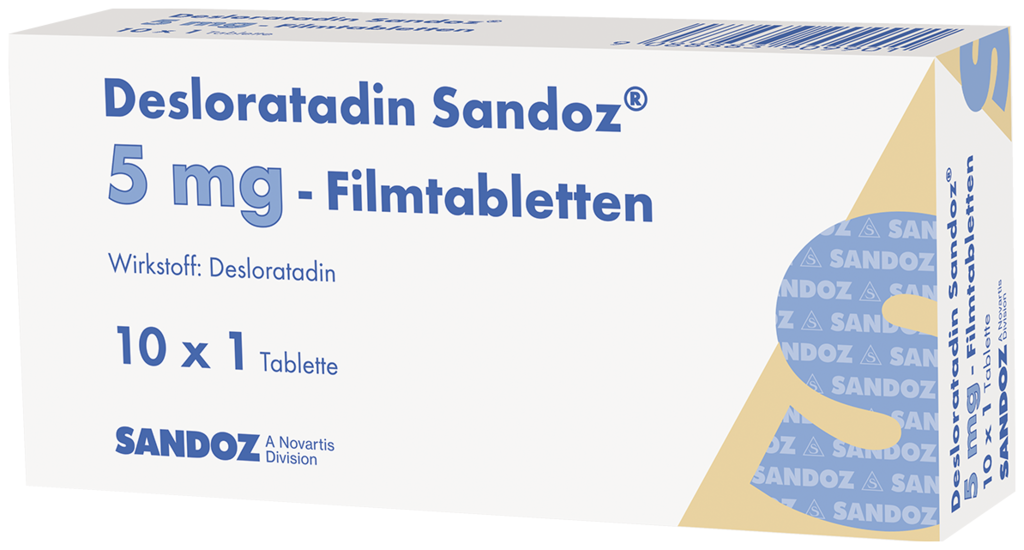Sandoz
Desloratadine Sandoz 5 mg - 10 film-coated tablets
Desloratadine Sandoz 5 mg - 10 film-coated tablets
受取状況を読み込めませんでした
What is Desloratadine Sandoz?
Desloratadine Sandoz contains desloratadine, which is an antihistamine.
How does Desloratadine Sandoz work?
Desloratadine Sandoz is an anti-allergic medicine that does not make you sleepy. It helps control your allergic reaction and its signs.
When should Desloratadine Sandoz be used?
Desloratadine Sandoz improves the signs of allergic rhinitis (inflammation of the nasal passages caused by an allergy, such as hay fever or house dust mite allergy) in adults and adolescents aged 12 and over. These signs include sneezing, runny or itchy nose, itchy roof of the mouth, and itchy, red, or watery eyes.
Desloratadine Sandoz is also used to eliminate signs associated with urticaria (a skin condition caused by an allergy). These signs include itching and hives.
Eliminating these signs lasts a full day and helps you return to your normal daily activity and sleep.
If you don't feel better or feel worse after 10 days, contact your doctor.
Contraindications
Desloratadine Sandoz must not be taken if you are allergic to desloratadine or any of the other ingredients of this medicine listed in section 6 or to loratadine.
Interactions
Taking Desloratadine Sandoz with other medicines
There are no known interactions between Desloratadine Sandoz and other medicines.
Tell your doctor or pharmacist if you are taking/using any other medicines, have recently taken/used any other medicines or might take/use any other medicines.
Pregnancy, breast-feeding and fertility
If you are pregnant or breast-feeding, think you may be pregnant or are planning to have a baby, ask your doctor or pharmacist for advice before taking this medicine.
Taking Desloratadine Sandoz is not recommended during pregnancy or breastfeeding.
Reproductive capacity
Data on male/female reproductive capacity are not available.
Driving and using machines
If you take the recommended dosage, this medicine is not expected to affect your ability to drive or use machines. Although most people do not experience drowsiness, it is recommended that you avoid activities that require mental alertness, such as driving or operating machinery, until your personal response to the medicine has been established.
Application
Always take this medicine exactly as described in this leaflet or exactly as your doctor or pharmacist has told you.
Check with your doctor or pharmacist if you are unsure.
Adults and adolescents (12 years and older)
The recommended dose is one tablet once daily with water, with or without food.
This medicine is to be taken orally.
Swallow the tablet whole (unchewed).
The duration of treatment depends on the type, duration and course of your symptoms. See a doctor if your symptoms persist or worsen.
- If your allergic rhinitis is intermittent (symptoms occur less than 4 days per week or last less than 4 weeks), treatment will depend on your previous course of the disease. Once the symptoms have subsided, you can stop taking it and resume it if they recur.
- If your allergic rhinitis is persistent (symptoms occur 4 or more days per week and last more than 4 weeks), longer treatment is recommended.
- For urticaria, the duration of treatment may vary from patient to patient. That's why you should follow your doctor's instructions.
Side effects
Like all medicines, this medicine can cause side effects, although not everyone gets them.
Serious allergic reactions (difficulty breathing, wheezing, itching, hives and swelling) have been reported very rarely following marketing of desloratadine. If you notice any of these serious side effects, stop taking the medication and seek medical attention immediately.
In clinical trials in adults, side effects were similar to placebo. However, fatigue, dry mouth and headache were reported more often than with placebo.
In adolescents, headache was the most commonly reported side effect.
The following side effects have been reported in clinical trials with desloratadine:
Common: (may affect more than 1 in 10 people)
- fatigue
- Dry mouth
- Headache
Adults
The following side effects have been reported during the marketing of desloratadine:
Very rare: (may affect up to 1 in 10,000 people)
- severe allergic reactions
- skin rash
- Palpitations or irregular heartbeat
- rapid heartbeat
- stomach pain
- nausea
- Vomit
- Upset stomach
- Diarrhea
- dizziness
- Lightheadedness
- insomnia
- Muscle aches
- Hallucinations
- Seizures
- Restlessness with increased physical activity
- Inflammation of the liver
- unusual liver function tests
Not known: (frequency cannot be estimated from available data)
- abnormal behavior
- aggression
- depressive mood
- dry eyes
- extraordinary tiredness
- Yellowing of the skin and/or eyes
- increased sensitivity of the skin to sunlight, including hazy sunlight and to UV (ultraviolet) light, e.g. B. from UV lamps in a solarium
- changed heartbeat
- Weight gain
- increased appetite
Children
Not known: (frequency cannot be estimated from the available data)
- abnormal behavior
- aggression
- slow heartbeat
- changed heartbeat
- Weight gain
- increased appetite
composition
The active ingredient is desloratadine.
Each film-coated tablet contains 5 mg desloratadine.
The other ingredients are:
Film-coated tablet core: corn starch, microcrystalline cellulose, hypromellose, colloidal silicon dioxide, hydrogenated vegetable oil (type 1)
Film-coated tablet coating: Opadry blue 03B50689 (hypromellose (E 464), titanium dioxide (E 171), macrogol 400 (E 1521), indigo carmine, Aluminum salt (E 132)).
Usually ships out within 3-4 business days
Share


